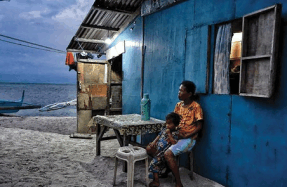LONE STAR


IN EARLY 1984 , the actress Parveen Babi announced her retirement from Bollywood in blazingly public fashion: she wrote about it in a cover story for the Illustrated Weekly of India. Titled “The Confessions of Parveen Babi,” the essay was diaristic and occasionally disturbing in its honesty. “Have you ever wondered what it is like to function in life, distrusting everything and everybody?” the actress, then 34 years old, wrote. “Slowly, one by one, I lost trust in everybody and everything around me. We trust most of the things and people around us without questioning. We trust the food we eat, the water we drink, the air we breathe.”
Diagnosed with schizophrenia in the late 1970s, Babi had experienced her latest breakdown just months before the article’s publication. She was nearing the end of a noteworthy career in Bollywood. In her ten years in the industry, Babi projected a new, assuredly “progressive” image for women in popular Hindi cinema in films such as Majboor and Deewaar. Along with her contemporary Zeenat Aman, Babi introduced audiences to a bohemian heroine who drank and smoked, who wore bell bottoms and skirts with thigh-high gashes, who brandished her sexuality without apology. Babi scaled international heights too, gracing a 1976 cover of the European edition of Time magazine as the avatar of “Asia’s Frenetic Film Scene.”
But once talk of Babi’s mental illness began circulating in Mumbai, industry figures began to see her as a liability. Many were cruel about her condition. “I think Parveen Babi is a hoax,” the filmmaker Prakash Mehra, who directed her in the 1982 film Namak Halaal, told the magazine Stardust in June 1980. “Her illness is [a] hoax. She is a liar and a cheat.”
In her cover story for the Illustrated Weekly of India, Babi would write that a voice in her head told her to leave Mumbai, to leave India entirely. Following her retirement, she settled in the US city of Corte Madera, just south of San Francisco. Babi spent the next few years severing ties with those close to her and dodging the limelight, living in New York and Houston, where she had skirmishes with law enforcement. Upon moving back to Mumbai, in 1989, she made no films, eking out a cloistered existence in her flat in Juhu. She would emerge in the public sporadically. In the early 2000s, she aired accusations against the actor Sanjay Dutt, claiming she had substantial evidence implicating him in the 1993 Mumbai bombings.
Babi’s allegations turned her into a target of the press, who could not quite grasp the contours of her mental illness. India Today, for example, belittled her as a “sex kitten” who became a “conspiracy theorist.” Only a few had sympathy for her suffering. “Can we please get off her case and leave the poor woman alone?” the columnist Shobhaa De asked fellow members of the media in a 2002 Times of India article. “Nobody has the right to lampoon Parveen. Least of all, those of us in media.”
TODAY, SOME MAY QUESTION the Illustrated Weekly of editorial judgement in running Babi’s story, given the fact that Babi was so clearly unwell. But her article is a remarkable document. Aside from a smattering of interviews she gave to film magazines and journalists over the years, the piece marks a rare instance in which Babi got to frame her story in her own terms, a privilege seldom afforded to her in either life or death.
You’re reading a preview, subscribe to read more.
Start your free 30 days





